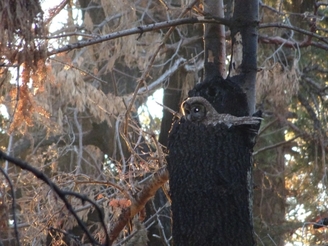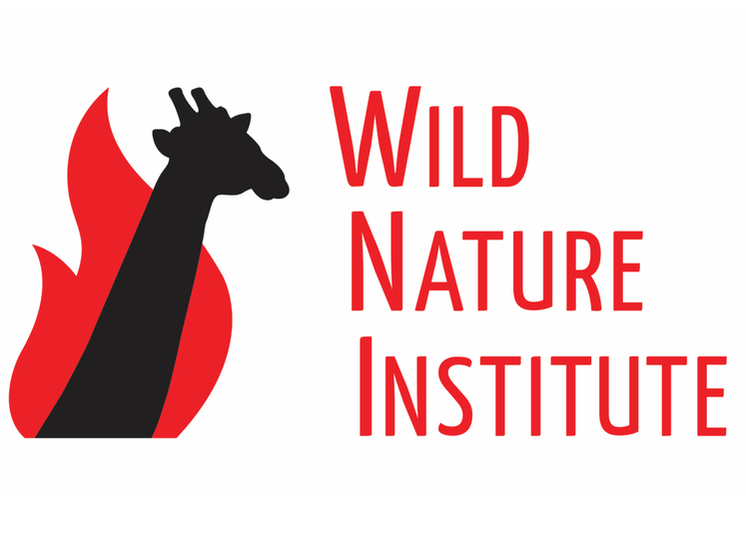 Spotted Owl nest in severely burned southern California forest, San Bernardino Mountains. Photo by Rachel Fazio. Spotted Owl nest in severely burned southern California forest, San Bernardino Mountains. Photo by Rachel Fazio. New research on the California spotted owl has found that severely burned forests that have not been post-fire salvage logged are used by the threatened raptor when foraging for their small mammal prey. Stand-replacing fires, also called crown fires or high-intensity fires, do not harm spotted owl foraging habitat. "We looked at spotted owl foraging behavior at multiple spatial extents and we found that whatever scale we used, the owls foraged in severely burned unlogged forests in proportion to their availability. In other words, they foraged in burned forest with the same likelihood as in unburned forest." said Monica Bond, lead author of the study. Wildfires over the past two decades have affected southern California spotted owl habitat to a greater extent than elsewhere in the range of the subspecies. From 2003 to 2007, spotted owl territories in the region were especially affected by wildfire, with more than 40% of 168 breeding sites in the San Bernardino and San Jacinto mountains experiencing at least one fire. "These frequent and hot fires make southern California forests a good indicator of what may happen in more northerly forests of California in a warming climate," said Bond. "Luckily, forests burned by high-severity fire can still be considered suitable foraging habitat for California spotted owls." Bond continued, "We also found these spotted owls strongly selected foraging sites close to streambeds, so we recommend implementing protective measures and management activities that conserve water and streamside forests." The study was published this week by scientists from the Wild Nature Institute and the Center for Biological Diversity in the Journal of Wildlife Management, a peer-reviewed scientific journal for professional wildlife biologists. This is the latest in a series of scientific papers that have documented how resilient spotted owls are to high-severity fires, including so-called megafires. Spotted owl pairs have been shown to survive and continue to reproduce in breeding sites that experienced severe fire, even megafire, with success that is the same or higher than unburned sites. Spotted owls have also shown a significant preference for foraging in severely burned forest patches in the Sierra Nevada. However, post-fire salvage logging, also called forest restoration by the US Forest Service, causes site abandonment and reduces survival. Logging in an attempt to reduce the risk of fire, often called thinning or fuels reduction, also has adverse effects on spotted owls. The only studies that claimed forest fires hurt spotted owls have had logging in large portions of the study area. "It's high time we stopped managing our forests with the futile and unnecessary goal of stopping severe fires. All the science from the field says fuel buildup and insects don't make forest fires worse. It is extreme weather like the Santa Anna winds in southern California that push fires to become very large, but we will never be able to stop these weather-driven blazes, so we should not risk our firefighter's lives out in the wildlands. Instead, we should repurpose the billions of dollars we waste each year fighting wildfires on making structures fire-safe in our forest communities," said Dr. Derek Lee, a co-author of the study. "Many native plants and animals thrive in the severely burned unlogged forest, and that response tells us that this kind of fire is natural and necessary to the ecology of the forest."
6 Comments
hayden
12/10/2016 02:18:11 pm
cool
Reply
Naomi
2/22/2017 09:01:29 am
Yea
Reply
Alondra Garcia
3/1/2017 11:17:39 am
I also agree with you Marcus
Reply
ALONDRA
2/28/2017 11:40:47 am
It is sad how people and other things destroy animals shelter and their food
Reply
Alondra Garcia
3/1/2017 11:20:29 am
It is so sad that people and other things destroy animals shelter ,food is so disstressful
Reply
Your comment will be posted after it is approved.
Leave a Reply. |
Science News and Updates From the Field from Wild Nature Institute.
All Photos on This Blog are Available as Frame-worthy Prints to Thank Our Generous Donors.
Email Us for Details of this Offer. Archives
July 2024
|
|
Mailing Address:
Wild Nature Institute PO Box 44 Weaverville, NC 28787 Phone: +1 415 763 0348 Email: [email protected] |
|

 RSS Feed
RSS Feed
